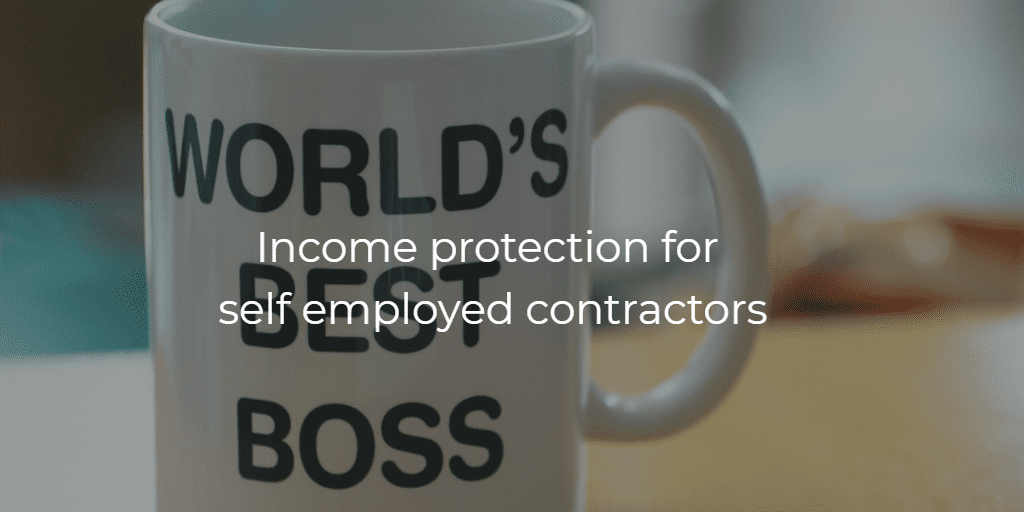Table of Contents


As an independent contractor you’ve experienced it all.
The great days where it’s gone spectacularly well and the other ones where you’ve considered packing it all in to permanently push pens.
Being self-employed is a rollercoaster.
Sure, your friends (and your ma) probably think you spend all day swanning around sipping fancy Ethiopian coffee and consulting, but there’s a boatload of paperwork and tax-keeping involved too.
There’s definitely the added bonus of a little more freedom and, at the very least, it feels like you’re not-so-entirely stuck on the hamster wheel we call capitalism.
Which is grand when you’re making bank and you’re doing something you enjoy.
But what happens if you get sick?
And I’m not talking a dodgy belly or a sore head after a big weekend.


Alas no, you are adrift in the ocean of life on your own here pal.
You may be making more moolah than your desk mates, but at least they’ll get paid if they get sick, whereas you’re gonna have to drag yourself out of bed and schlepp into work.
Grand if it’s the sniffles, but if it’s anything more serious, you’d better hope that the Solpadine hits fast and hard.
Why?
Well, because the company you’re contracted to doesn’t owe you any sick pay or sick cover.
Not a penny.
You’re gonna have to cross your fingers and either live on bread and warer or hope you had the foresight to look into Income Protection Insurance.
Yeah, yeah, insuring your income can seem like a bit of a long con (giving away some money in the hopes of getting more money if something bad happens), but it can be a life-saver when it comes down to it – especially as an independent contractor.
How a customer of mine survived a 90% pay cut
Think of it like this: you insure your health, your car, your house, so why wouldn’t you look after the source of income that pays for all of this stuff?
If the money dries up, you’re in big trouble – so why not be prepared?
As for the government, it’s actually only in the last two years that self-employed people have been entitled to long-term sick pay, which means you’d be eligible for State income support in the form of an invalidity pension.
But a nasty caveat applies: invalidity pension is a lot harder to qualify for than normal illness benefit.
You have to be off sick for 12 months before you can be eligible for it and then you have to be able to prove that you’ll be unable to work for 12 more months.
Or, you need to be permanently incapable of work.
The main points you need to know are:
What I’m saying here is that the invalidity pension for the self-employed is not necessarily something you’d want to rely on.
Let me introduce you to Income Protection for contractors and Serious Illness Cover, two potentially very good friends of yours if you’re struck down with a bad illness that leaves you unable to work for more than a few weeks.
Income Protection is a type of insurance that pays you up to 75 percent of your salary if you’re unable to do your job because of ANY sickness, disability or injury.
The important bits here:
and
Serious Illness Cover, on the other hand, offers a tax-free lump sum if you’re out of work because of one of the serious illnesses covered in your policy.
The tax-free lump sum can be as much as you like, depending on how much cover you want to buy, so it can seem like a solid plan – but the definitions of what illnesses are actually covered can be tricky to satisfy.
For example, they might cover one type of cancer but not another – and if you get the ‘another’, there’s nada in it for you.
No Bueno.
No payout but the bills still mount up.
You can read more about the pros and cons of both Income Protection or Serious Illness Cover by clicking here. It’s worth five minutes of your time, I promise.
Between you and me, I’d swing for Income Protection if I were you.
In fact, I did.
Story time: it was a few years ago (though it feels like yesterday) and my wife had just been made redundant (thanks Credit Crunch) and we’d just had twins – so we three kids under three.
There was a lot of lying on the floor, crying, and sleeping in that first year – at least the kids were well behaved.


I was starting up this-here-business and this-here-blog and we’d just bought a house.
You can see why there was so much lying on the floor in tears.
In all seriousness, that’s a lot of stuff to happen – but it’s standard life stuff that made me realise how important having back-up for my income is especially as I was the sole earner.
So, I pulled the trigger and got Income Protection.
I’m now 10 years older and the premiums seem ridiculously cheap ✌
You can insure up to 75% of your income.
Your first question is probably about the 75 percent – more specifically, “75 percent of what?”
If you get a quote and the number seems a bit high, remember you don’t actually have to cover the full 75 percent – it’s all a matter of affordability and how you live now, and want to live if you get sick.
If you can’t afford the full shebang and think you could get by on 50% of your current income, then go for it.
Some income proteciton is better than none.
You should also consider the deferral period – this is the amount of time before Income Protection cover kicks in – generally, 4, 8, 13, 26, or 52 weeks.
The longer the deferral period, the cheaper your cover will be, but make sure you strike the balance between cheap and how long you could actually afford to live without your income.
26 weeks is the most popular deferred period.
It strikes a balance between affordability and offering adequate income replacement should you be unable to do your job long term.
There are a couple more caveats too:
My last note is to consider where you’re buying your Income Protection from.
Don’t just choose the first insurer you see when you’re on the way to Spar to buy a chicken fillet roll for lunch.
If you were buying a car, you wouldn’t drive off in the first one you came across.
The clutch might not work or it might be an awful banger altogether.
Get a quote from a decent broker or call around all of the insurers yourself.
Make sure you get a range of prices and include different coverage amounts and deferral periods (or ask me to do it by completing this questionnaire)
Essentially, know what you’re getting and why you’re getting it.
In your day-to-day as an independent contractor, you know what you’re worth – so apply the same rules to your Income Protection.
I see this a lot, you’ve taken the plunge, left the comforts of the employee role and have set out on your entrepreneurial quest but you don’t have a history of stable income as yet.
If this is you, I advise you to insure up to 75% of your expected income for the year, let’s say it’s €60,000 so you insure €45,000.
If you get sick and need to claim in the first 6 months, the insurer will examine your income in the 12 months before your disability in order to calculate your payout.
To get the full €45,000, your average taxable income over the previous 12 months (from your previous role and your self-employed role) must have exceeded €60,000.
If it doesn’t, the insurer will pay out 75% of the actual average annual income, and yes that may be lower than the €45,000 you expected.
If you’ve done better than expected (go you!) and your average income exceeds €60,000, the maximum the insurer will payout is €45,000.
Keep an eye on your income, as you earn more, you should increase your income protection cover.

I know that isn’t the easiest concept to get your head around so if you want, please give me a buzz on 05793 20836 and I’ll answer your questions.
Look, if you’re flying solo and don’t really have any responsibilities, you’d probably be alright for a few months if you’re off sick or injured – but after that, it gets hairy fast.
If you have responsibilities or a family, you’d be an awful eejit not to get income protection – especially as you’ve read this whole article, so you’re clearly considering income protection.
You’ll never be younger or healthier so your premiums will never be cheaper.
Do it.
Give me a call on 057 93 20836 and let’s get it sorted or complete this questionnaire to get the ball rolling.
Thanks for reading
Nick
As Ireland's leading life insurance broker, we specialise in comparing the rates and policies from the top five Irish life insurance providers and offering the very best value quotes to suit the individual needs of our clients. Our expertise lies in finding a suitable insurance plan for those with specific needs, be it a particular illness, occupation or claim history, we've got you covered in every sense!
Watch our video